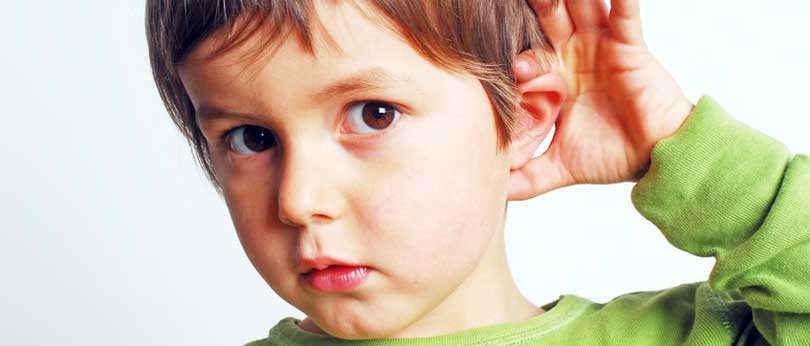Can your child hear?
- Hearing testing is routine in all newborn children in Australia
- Because approximately 1 in 500 babies born have a hearing loss, all babies in NSW are now offered an accurate hearing screen at birth
- By detecting hearing loss in the first days of life, intervention will be able to start at an early age
- This will give the child the best chance in developing normal speech and language
- However, sometimes hearing loss can develop months or years later, even though a baby passed the original screening at birth
Temporary hearing loss
- Some children develop temporary hearing loss (“glue ear”) due to fluid in the middle ear (behind the eardrum)
- This may follow a cold or sometimes occurs for no obvious reason
- If your child appears to have hearing loss for longer than a week, a hearing test should be organised and your child needs to go to the family Doctor or Ear Nose and Throat Specialist
Permanent hearing loss
- Some children gradually acquire a permanent hearing loss
- This may occur anytime, even in adolescence
- A child is usually unaware of the hearing loss
Your child’s hearing needs to be checked if your child is:
- Not hearing properly
- Has unclear speech
- Not speaking at the same level as other children of the same age
- Having difficulty learning to read or spell
- Parents and grandparents are usually the first people to recognise kids hearing loss
What makes my child at risk?
Certain conditions make a child more susceptible to hearing loss:
- Deafness in the family
- Prematurity (born too early) or weight less than 1500 g at birth
- Baby very ill at or around the time of birth
- Meningitis or encephalitis
- Viral infections during pregnancy eg, rubella, cytomegalovirus (CMV)
- Birth defects of the ear, nose, face or neck.
Hearing testing
Hearing testing is modified depending on the age of the patient
- Your child usually wears some type of earphones
- This test is modified slightly in the toddler age group and made into a game
- The child is asked to play with a toy (i.e., touch a toy, move a toy) every time the sound is heard
- This test relies on the cooperation of the child
Hearing testing for infants
Behavioural audiometry – a screening test used in infants to observe their behavior in response to certain sounds
Hearing tests for toddlers
Play audiometry – a test that uses sounds at different volumes and pitches to test your child’s ears
Hearing testing for older children and adults
Evaluation of hearing for the child older than 3 to 4 years may include the above mentioned tests, along with the following:
Pure tone audiometry – a test that uses sounds at different volumes and pitches to test your child’s ears
- The child usually wears some type of earphones
- In this age group, the child is simply asked to respond in some way when the tone is heard in the earphone
Tympanometry (also called impedance audiometry) – a test that can be performed to help determine how the middle ear is functioning
- Tympanometry does not tell if the child is hearing or not, but helps to detect any changes in pressure in the middle ear




